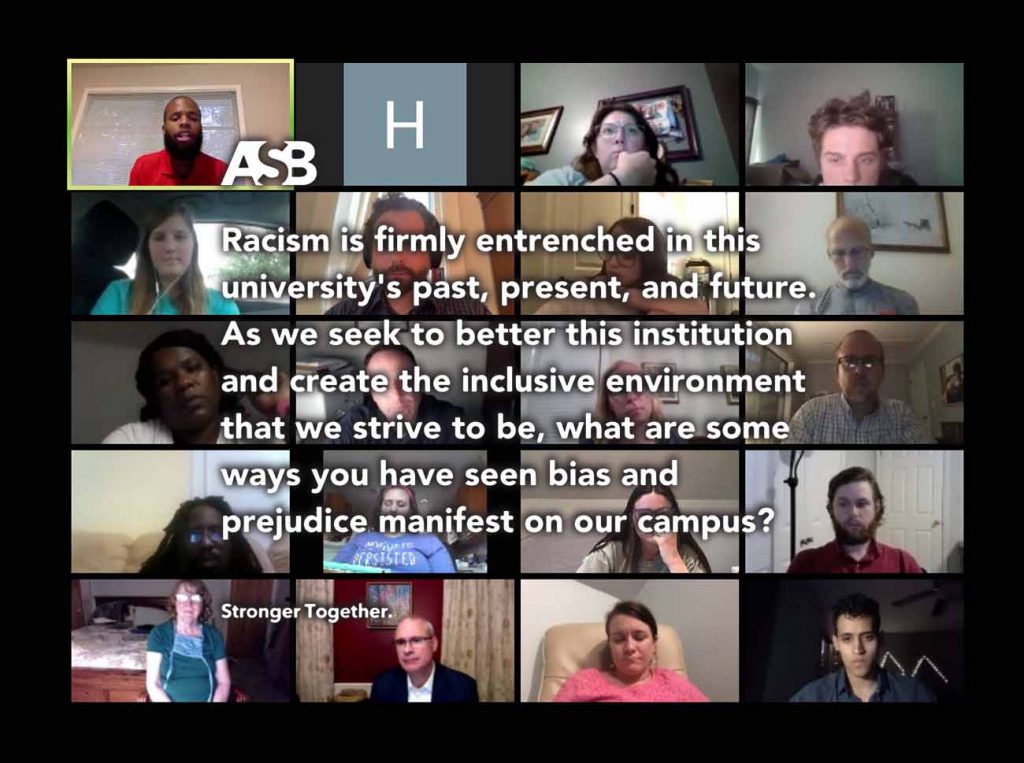
Over 200 members of the university community, including Provost Noel Wilkin, women’s basketball coach Yolett McPhee-McCuin, Associated Student Body President Joshua Mannery and Black Student Union President Nicholas Crasta, gathered in a Zoom meeting on Tuesday night to “unpack the manifestations of racism throughout America.”
“Time has proven that my color is deemed a threat in today’s society, despite the intelligence, culture and excellence my color brings to the world every day,” Crasta said. “The goal of this dialogue series is to allow our community to heal, process and move forward in light of all the recent national events.”
The event was the first in the Stronger Together Dialogue Series hosted by the University Counseling Center, the Black Student Union, the Associated Student Body and the University Division of Diversity and Community Engagement, and it was largely organized by Crasta and Mannery.
“I was a little nervous about opening things up primarily because it is such a pivotal and historic moment in our nation’s history, as well as the fact that this is the first time that we as a UM community have gathered like this in a while,” Mannery said. “I didn’t know if I should be the one to make a framework for how we plan on moving forward, but then I thought about George Floyd.”
The over 200 community members in attendance were split into three “breakout rooms” where moderators led discussions based around four questions about bias, prejudice, the impact of COVID-19 on minority groups, and the protests against police brutality that have persisted throughout the nation over the past week.
“Each breakout room ended up having its own kind of focus,” Mannery said. “For us, I think that was addressing how we support our students of color, both in regards to everything that is happening right now, but also with the day to day. How do we empower our students to feel comfortable in the Grove and in Greek spaces?”
Other rooms centered on the topics of how people see color, how white people can act as effective allies and black mental health.
While some prominent UM community members like McPhee-McCuin and Katrina Caldwell, outgoing vice chancellor for diversity and community engagement, participated in the discussion, Wilkin did not.
Mannery, who was one of the moderators in Wilkin’s room, said he was not surprised by the Provost’s decision to listen instead of speak.
“I was wondering if I wanted to ask him specifically if he had anything he wanted to say, but from the conversations I’ve had with Provost Wilkin, I think he is a really effective listener,” Mannery said. “But, I would hope that when it comes to the action phase that he’s a little more vocal and the administration altogether is more vocal because we need them as part of that change.”
E.J. Edney, the director of the Center for Inclusion and Cross-Cultural Engagement, acted as one of the discussion leaders. He explained the baseline expectations for participants of honesty and respect, but he also expressed personal frustration about the cyclical way in which the UM community and the nation as a whole handles racial injustice.
“I’m honestly tired of being in the cycle of event, and then mourning and healing, and then event, and then mourning and healing, and that lull that happens in between,” Edney said. “There is an opportune moment for us to do something to be sure that we continue to push to create better action toward creating a better world.”
Anthony Siracusa, university director of community engagement, echoed similar concerns.
“We’re living in a moment that Michelle Alexander described as a new Jim Crow, where racism has become institutionalized, including in our criminal justice system. I want to think about how we can together heal, build allyship and take action,” Siracusa said. “In the Office of Community Engagement, that last piece is where we spend a lot of our time focusing. How might we build a different world, a more just world?”
Mannery said he knows the answer to these broad questions is not going to be found in a singular, ASB-sponsored discussion, but he thinks events like these are a step toward understanding.
“As a black man serving as student body president at the University of Mississippi in the year 2020, my voice and my passion for each and every student here is needed now more than ever. Stronger Together is more than just tonight’s event.”


























